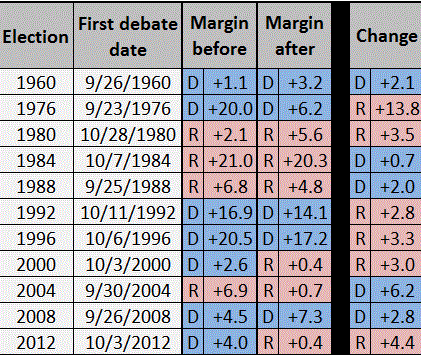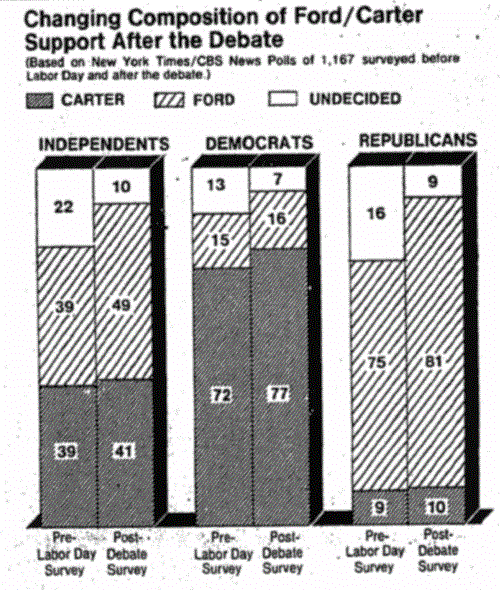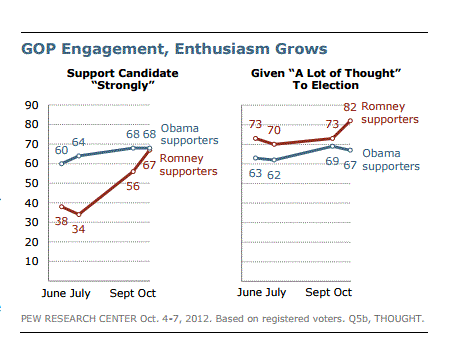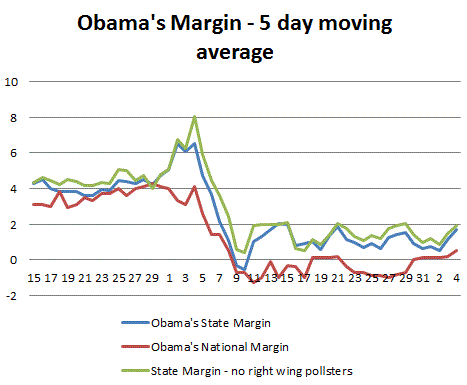A must-read review of what recent history tells us about the impact of presidential debates. You can find Dan Guild’s past writing for this site here and here. -promoted by desmoinesdem
Debates have arguably remade the race for the Presidency in 1976, 1980, 2000, 2004 and 2012. Even in races where arguably they are less important, they still are significant events. Having said all of this there are patterns that repeat themselves. Guideposts that can help evaluate how they will affect this race. Here they are:
1. Typically debates consolidate support within their Party for each candidate. Where this is unequal, the candidate who is behind tends to benefit.
2. In races where there is significant discontent, debates often help the candidate of the party that is on the outside.
3. Third Parties frequently decline afterwards
The following table is from the website Crystal Ball. Ironically my own data does not agree with some of the data here (my own database of Presidential Polling is here).
A couple of observations:
1. Usually the candidate who is behind benefits.
2. Most of the swings here are larger than the current Clinton lead.
3. In 3 of last 4 elections debates have remade the race. In 2000, 2004 and 2012 a significant lead was reduced, and twice the lead actually changed hands.
So what does this mean for the debate today? I think it suggests tension.
The 2016 election can be thought of the product of two forces, themselves a product of economic and political polarization:
1: Rising economic insecurity and white racial anger
The best diagnosis comes from Zeynep Tufekci:
If there’s elite + left failure at times of cultural transition; economic anxiety and threat, Ethno-supremacist ideologies rise. So common. The least productive, misleading discussion here is “is it race or economic” anxiety. They’ve LONG BEEN INTERTWINED. Here and in Europe. Trump promises protectionism. US bargain was: you lose good jobs, you get cheap stuff. Of course people want good jobs. Jobs are identity.
I still think Trump cannot win (due to lack of organization) and this country is moving moving forward on race. But if left unsolved, the economic anxiety part will come back again, and not always in a nice and polite “can we have some job security and sane redistribution” format.
This is not just a US phenomenon as the recent Brexit referendum shows. What is relevant here is that this has driven deep unhappiness with the status quo.
2: The reality of America: increasing social tolerance and diversity
The truth is America is becoming more diverse. It is becoming more socially tolerant (see Gay Marriage). Economic insecurity has increased: of this there is no doubt. But many seek an answer not in race but in anger at Wall Street and other liberal/populist targets.
Clinton and Trump both are imperfect candidates. Clinton’s problem lies in part with the perception that she is too allied with the forces many of her natural constituents have identified as the source of economic inequality. She is the status quo candidate at a time when the status quo is deeply unpopular.
Trump, on the hand, gives voice to the White anger. But his entire personality: racist, sexist, dishonest is an awful fit for a country that is defined by tolerance and diversity.
So the debates:
There is significant discontent with the status quo. The right track/wrong direction numbers are terrible. As we will see, in the past this has represented an enormous opportunity for the candidate of the party that does not occupy the White House.
But there is also a significant enthusiasm gap. My sense is there is significant discontent among Democrats. The debate offers an opportunity to close that gap.
Each candidates enters with predictable objectives. For Clinton it is to resolve the increasing doubts about her campaign. For Trump it is to address concerns about his temperament, and to hammer Clinton as a member of an unpopular status quo.
Let’s look at what past debates teach about this:
Debates allow candidates to consolidate support
To show how old this trend is, I took the following from the New York Times showing the effect of the Ford-Carter debate in 1976. It is worth noting that BOTH candidates saw an increase in their support within their own party.
Now lets look at 2012. Prior to the debate there was a significant gap in enthusiasm. Republicans before the debate did not believe that Romney had a chance, and in fact there was discontent among Republicans.
This shows the result. I project national leads using state polling – a method more accurate than averaging national polls. On the eve of the debate in 2012 Obama was getting close to his 2008 margin. All of this ended after the first debate, and the race was remade.
The lesson here for Clinton and Trump is obvious. People want to view their candidate as someone they can believe in and fight for.
This is where the opportunity, and the advantage is with Clinton. If Clinton can put to rest doubts about her ties to the status quo, and if she can reassure Democrats about her ability as a candidate, she will will do much to solve the Democratic Enthusiasm gap.
Debates and the Status Quo
Perhaps the ultimate example in debates of attacking the status quo took place in 1980. The effect of the debate the next morning was not apparent. The New York Times the next morning carried the headline “No Apparent Winner”.
The debate is worth remembering because the lines of argument were in a way very similar. At the time Reagan was regarded as simply too radical to be a reliable president. Reagan’s basic approach was to attack the status quo: an easy task given the times.
Two lines are memorable and have relevance:
“There you go again” – Ronald Reagan uttered this line in response to Carter raising Reagan’s prior statements on social security. Carter’s favorable rating in the CBS Poll taken the day after the debate was 40 positive 48 negative. He knew the only way to beat Reagan was to attack him as unsteady. Reagan’s response was quite effective: designed to show that he was not as radical as he was being portraide.
“Are you better off know that you were four years ago” – it was in the end the final question Reagan sought to ask. It was an arrow aimed at Carter and his performance.
We will see echoes of each of these lines. Trump will try tonight, if he is smart, to re-assure voters that he is not a wild eyed radical. He will seek to portray Clinton as the status quo.
Did the 1980 debate matter? The table below compares the polling. In some polling Reagan was helped, in some he was not. But there ware another effect as well. John Anderson, who ran as an independent, would see his percentage drop from about 10.5 to 7.5. I would expect to see Libertarian Gary Johnson’s numbers decline after tonight as well.
Taken as a whole the 1980 debate was part of process that would turn a close race into a 10 point margin.







1 Comment
a pre-debate argument that's relevant post-debate
HRC did what 5-15 Republicans could not do: best Trump in the debate and get the better of him during the debate by using the right kind of bait. She may well be able to, as the article tells us, consolidate, motivate, and close the enthusiasm gap. Folks might have become discouraged lately because it seemed as if Trump was both too commanding and unpredictable for anyone to bring him down. I think HRC found a way. Ignore him when he’s acting out and chastise him firmly and calmly for his more egregious behaviors and speech. The end result is what more than a few people were hoping to see: a smart, caring person beating a bully. And it was done by letting (by not interrupting) the bully show himself to be a bully. Another way to characterize it is to say that Donnie suffered the worst humiliation that could be visited upon any man-boy: he got beat by a girl. And when it was happening during the debate, his attention span shrank, his frustration tolerance went to nil, and he looked decidedly unpresidential. This should all be worth at least 1 percentage point (net) in favor of HRC. I hope.
dsmarron Tue 27 Sep 12:11 AM